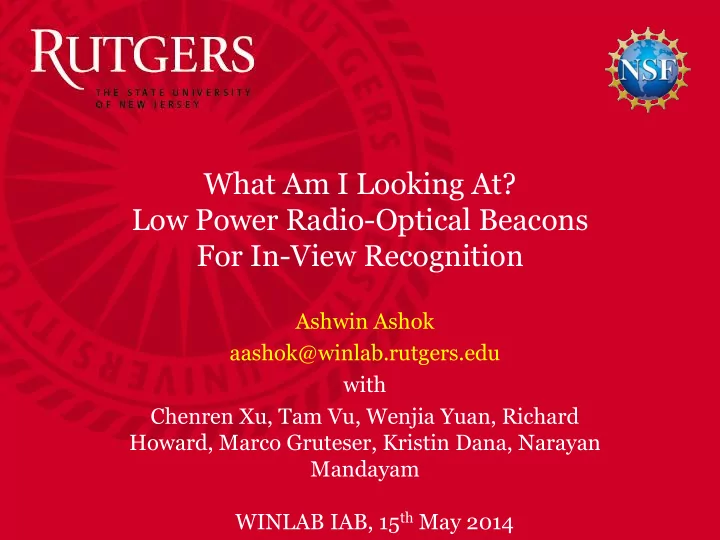

What Am I Looking At? Low Power Radio-Optical Beacons For In-View Recognition Ashwin Ashok aashok@winlab.rutgers.edu with Chenren Xu, Tam Vu, Wenjia Yuan, Richard Howard, Marco Gruteser, Kristin Dana, Narayan Mandayam WINLAB IAB, 15 th May 2014
The In- View Recognition “Problem” What is it? Where is it?
Towards augmented reality Google GLASS ActiveBat system (Ultrasound) ARTags ( fiducial markers)
What technology is best? Use the best of both worlds!
Low Power Radio-Optical Beacons
Mechanism ID High intensity Extremely short Synchronized using IR strobe duration using RF channel RF
Rethinking IR transmitter design Energy Consumption Remote control existing IR technologies GigaIR IrDA Our goal Distance Range
Leveraging directionality in receiver for AoA Small size/wearable Sample IR pulse at micro-sec resolution
Prototype Radio (380 us) TX SLEEP IR light beacon (10 us) Duty-cycling period 1s RX (Always ON) Sampling the Noise Angular range : +/-20deg Distance range : 3-10m (depends on IR pulse length) 9
Evaluation scenarios
Setup and Metrics Recognition Accuracy angle of arrival (horizontal, vertical) distance (along direction of view) Energy consumption oscilloscope measurements of battery current draw
Accuracy : angle
Accuracy : distance
Battery energy consumption (TX)
Tradeoff Average
Towards improved designs Hardware design: Increase angular range : 150deg Protocol design: Transmit only when the receiver is in-view
Summary • Infrared link for precise orientation and distance estimation • Low power communication & synchronization using radio link • Prototype: – Angular accuracy within 1.5 deg on the horizontal and vertical, range upto 9m – very low battery power consumption, supporting tag battery life of the order of years. • Caters to many venues of research: augmented reality, localization, energy optimization
Questions? Contact: aashok@winlab.rutgers.edu http://winlab.rutgers.edu/~aashok/
Recommend
More recommend